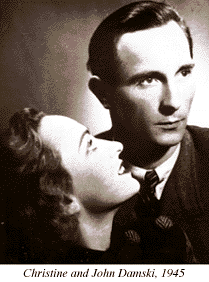
JOHN DAMSKI: After Christine and her mother got their Aryan papers in Warsaw we all went back together to Czestochowa, where Christine had found a place to live. There we decided to split up; I thought we had a better chance for survival that way. I rented a room in a farmer's house for my "widowed aunt"-- Christine's mother--in Olsztyn. It was a little village of about a thousand people, just twelve kilometers from Czestochowa. Soon after, I quit my job in Zamosc, and moved to Czestochowa to be with Christine. We lived there for about a half a year, commuting every weekend to Olsztyn to visit her mother. Everyone believed Christine and I were married.

"Mr. Damski, the Gestapo from Zamosc have been here looking for you. They said your wife is from a Jewish family in Zamosc."
Apparently somebody from Zamosc recognized Christine on the street, followed her home, and reported it to the Gestapo. I went inside, quickly gathered everything up in a bed sheet, and left with my bundle. I took the next train to Olsztyn to live with Christine and her mother.
For a brief time I had a second "aunt" in Olsztyn, the mother of a Jewish man whose friend I helped to obtain false papers. When this woman left Olsztyn for Kielce, she was betrayed and arrested. In separate incidents her son was also arrested, released and later shot. As a result of the connections between the two "aunts" rumors began to circulate in Olsztyn that my aunt, "Mrs. Olszewska," might be Jewish. Christine and I decided we needed to send her to a safer place.
At the Czestochowa employment office we discovered that they were recruiting Polish volunteers to work in Germany. Christine's mother had good papers saying she was a Polish widow, so we signed her up to work in a restaurant in Bad Reichenhall, a spa town in Bavaria. We felt she would be safe in Germany; no one there would suspect that she was Jewish. The Poles could recognize Polish Jews--they were their own people--but the Germans couldn't. We were much more afraid of Poles who might blackmail or betray her, than we were of Germans. To the Germans she would simply be a Polish peasant woman. In Germany people were not so interested in these things anymore. By then the Jews were non-existent for them; they had all been deported.
In Olsztyn I found work as a photographer, taking pictures of communions and weddings, trying to make a buck however I could. It was the autumn of 1943. I was photographing a wedding one day when a fellow who I did not particularly like, came up to me and said he wanted to speak to me in private. We went outside.
"Mr. Damski, some people here are saying that your wife is Jewish."
"What are you talking about?"
"I'm not asking you if she is or isn't, but I think it would be better for you if you left."
Such a nice fellow. In the same village there were four or five Jewish families hiding on Polish papers. At least half of the town knew about them. Nevertheless, I didn't want to take any chances. At five o'clock the next morning I put Christine on the train to Warsaw. I stayed behind to pack up our belongings.
In Warsaw I found a job managing a fruit and vegetable store that sold exclusively to Germans. Now that we were starting over in a new place, I arranged for a very fine false marriage certificate, so that there could be no questions about that. Nobody knew Christine was Jewish, but nevertheless, we had to live quietly, on the side; we had to be careful. We were used to the hard conditions; that was not the bad part. The important thing was to survive, not to be caught.
The terror in Warsaw went on all the time; it was not just directed against the Jews in the ghetto, although that was on a different scale. I was once on a truck, coming back from a buying trip for the store, when suddenly we saw the S.S. drive up in two or three trucks. It was a place where people had little garden plots to raise vegetables. The men from the trucks just started shooting at them. They shot maybe ten people, jumped back on their trucks, and took off again. Random killing like that was going on all over Poland.